27.06.24.UT NEWS.(Untouchables News)India.chennai.26.by Team Sivaji.
Telangana: 14-Year-Old Dalit Boy 'Tied Up, Beaten For Plucking Pomegranate'
The victim, belonging to the Scheduled Caste (SC) community, had climbed the compound wall of the headmaster's house to pluck a pomegranate.

A 14-year-old Dalit boy was allegedly tied up and beaten by a retired government school headmaster for plucking a pomegranate from his house in Kesaram village in Shabad mandal. The incident occurred on June 22 and came to light after the boy's mother lodged a complaint on June 24.
According to the police, the victim, belonging to the Scheduled Caste (SC) community, had climbed the compound wall of the headmaster's house to pluck a pomegranate. Upon discovering the boy, the house owner tied his hands and legs with a rope and allegedly beat him. A photograph showing the boy lying on the ground in a distressed state has gone viral, further amplifying the outrage, according to a report on PTI.
The accused has been identified as 80-year-old Madhusudhan Reddy, a former government school headmaster.
The victim's mother, who went to the spot to rescue her son, was allegedly abused by the headmaster and his son. Based on her complaint, the police have registered a case against the man and his son under IPC sections 342 (wrongful confinement) and 324 (voluntarily causing hurt). Additionally, charges under the Juvenile Justice Act and the Scheduled Castes and Scheduled Tribes (Prevention of Atrocities) Act have been filed, as per the report.
The authorities have assured that a thorough investigation is ongoing to ensure justice for the victim.
In April 2024, an 8-year-old boy was thrashed for allegedly touching a water bucket at a village in Rajasthan’s Alwar district. The incident took place while the boy went to drink water at a hand pump located within the government school. However, the man who was filling the bucket immediately assaulted the boy. The man, belonging to an upper caste, reportedly assaulted the boy since he touched the bucket.
Editorial: Nipping a tumour The committee was constituted in the aftermath of an incident
https://www.dtnext.in/news/city/editorial-nipping-a-
‘They’re like Superwomen’: Tibetan Buddhist nuns create a sand mandala to help heal after mass shooting
One of the motivations behind the mandala is to help the Lewiston-Auburn community recover from the trauma of the 2023 mass shooting.
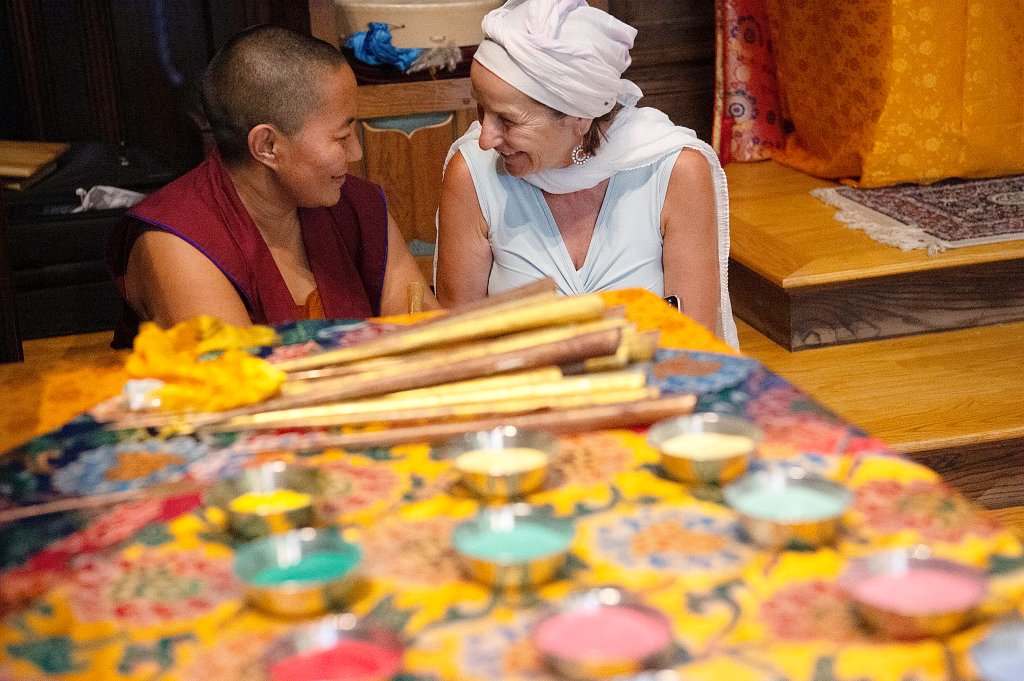
LEWISTON — Tibetan Buddhist nuns have arrived to create a mandala in the United States for the first time and to help the community recover from the trauma of the mass shooting.
The Venerable Tenzin Dasel, a Buddhist nun and spiritual adviser at Bates College, conveyed the significance of the Jangchub Choeling Nunnery’s historic visit to Lewiston.
“This is the first time in history that (Tibetan) Buddhist nuns are creating a sand mandala in the United States,” she said.
Throughout the week, the nuns will perform the laborious task of transforming innumerable brightly colored grains of sand into an elaborate and ornate Buddhist devotional image known as a mandala. Learning how to create a mandala is a challenging feat, one that only the most gifted of Buddhists can add to their arsenal of spiritual practices.

Buddhist nuns create a Buddha sand mandala Tuesday at the Peter J. Gomes Chapel at Bates College in Lewiston. They use metal funnels to guide grains of colored sand into the mandala. From left are Venerable Cungia Tsomo, Venerable Sonam Dolma and Venerable Sherab Dolma. Daryn Slover/Sun Journal
The Venerable Thukten Dema, one of the nuns from the Jangchub Choeling Nunnery in southern India, recounted that it took “the smartest among” the nuns nearly “nine months” of repetition to master the medicine Buddha sand mandala, only one type of the many mandalas the nuns have recently learned how to make.
A mandala, Dasel explained, is a tool that brings “visualizations of sacred spaces and figures” to life in three-dimensional form. Occurring during meditation, these visions are transformed into a “sacred circle” where spiritual symbols are arranged in a complex, geometric pattern. Elaborating on the iconography of the medicine Buddha mandala, Dema pointed out that it includes eight bowls to represent the eight medicine Buddha brothers.
As they work inside Bates College’s Peter J. Gomes Chapel from 9 a.m. to 5 p.m. this week, the nuns said they encourage the public to come and view the medicine Buddha sand mandala as it is being created. Those who look at the mandala with good intentions, positive thoughts and reverence will receive the blessings of the medicine Buddha regardless of their religious identity, Dema explained.
Dasel stressed that the ritual is open to everyone because it is “not about becoming a Buddhist but about becoming a better human being.”
When the sand mandala is completed Friday, the nuns will host a closing ceremony at Gomes Chapel from 5-6 p.m. At its conclusion, they will sweep away and disperse the mandala by pouring most of the sand into Lake Andrews.
Some of the sand, however, will be parceled out into small bags. While most of these keepsakes will be given to onlookers who have felt a meaningful connection with the mandala, Dasel also hopes to offer some of the sand to Just-In-Time Recreation and Schemengees Bar & Grille, the sites of last year’s mass shooting in Lewiston.
For Dasel, who helped organize the event, one of the motivations behind the mandala is to help the Lewiston-Auburn community recover from the trauma of the shooting by generating positive energy that would help cure the community’s emotional, spiritual and environmental wounds. When the nuns asked what mandala they should make for Lewiston, Dasel said she chose the medicine Buddha mandala for its healing power.
Another goal of the five-day ritual is to celebrate the nuns’ achievement as the first women to create the mandala in the U.S.
As Dasel recounted, one of her goals as an the American-born Buddhist nun is to give her fellow nuns a platform to be “spiritual leaders,” a role that has long been denied them due to their gender. For Dasel, all the nuns are feminist pioneers or, as she pointed out, “they’re like Superwomen.”
Dasel and Dema laughed as they pointed out how their signature red robes are similar to the iconic cape of the famous DC Comics’ heroine.
The biographies of these nuns reinforce their message of female empowerment. A graduate of Emory University, Dema was one of the first Buddhist nuns to attend an American university.
Until she became the first woman to pass the rigorous examination that determines which Buddhist monks and nuns get to go to university in the U.S., only Buddhist monks had been granted the privilege of receiving higher education in the U.S.
Buddhist nuns create a Buddha sand mandala Tuesday at the Peter J. Gomes Chapel at Bates College in Lewiston. They use metal funnels to guide grains of colored sand into the mandala. From left are Venerable Cungia Tsomo, Venerable Sonam Dolma and Venerable Sherab Dolma. Daryn Slover/Sun Journal
Buy Image
Performing the sand mandala ritual also allows Jangchub Choeling Nunnery to collect donations — a much needed source of economic support. Since Tibetan Buddhist nuns give up their material wealth and depend on their nunnery and the hospitality of others to survive, this revenue is vital in aiding the nunnery, its nuns and their mission. It also ensures they can continue spreading Buddhist teachings, traditions and rituals across the globe.
Visiting the U.S. also carries a special significance for the nuns. According to Dasel, it allows the nuns to show their support for liberal democracy.
Many of the nuns from the Jangchub Choeling Nunnery are refugees from Tibet. Because of the Chinese government’s persecution of Tibetan Buddhists, they were forced to flee their homeland and find refuge in southern India.
In addition to creating a sand mandala, the nuns will perform two additional Tibetan Buddhist rituals, the Dakini dance and the Chod-Puja, Wednesday from 6-7 p.m. They are some of the first women to perform these traditional rites as well. Following these performances, spectators can visit the medicine Buddha sand mandala — after taking their shoes off first.
Buddhist nuns Geshemia Yeshi Sangmo, left, and Lobsang Kumsel enjoy each other’s company Tuesday at the Peter J. Gomes Chapel at Bates College in Lewiston. Daryn Slover/Sun Journal
Buy Image
On Tuesday afternoon, the nuns performed these rituals for the first time in Lewiston. Many spectators snapped photos of the nuns and expressed their joy at being a part of the historic moment.
Alison Baird, who has been practicing Buddhism for roughly 18 years, said she’s seen the sand mandala, the Dakini dance and the Chod-Puja performed before — but only by men. Since these rituals have been the exclusive domain of monks for so long, she explained that it was almost unthinkable to imagine that women would someday get the opportunity to perform these rites as well.
Reflecting on what witnessing the first women to create a sand mandala in the U.S. meant to her, she said, “It’s really incredible … it’s wonderfully exciting to share something that profound with other women” for the first time.
Dalit woman was going to get medicine, Anwar gangraped her along with his accomplices, then beat her brutally: Lucknow Police arrested, search for 6 continues

On the complaint of the victim, the police registered a case against a total of 7 accused including 30-year-old Anwar. Action has been taken against all of them under Section 376 (D) and 506 of the Indian Penal Code (IPC) along with Section 3(2)(V) of the SC/ST Act.
A case of gangrape of a Dalit woman has come to light in Lucknow, the capital of Uttar Pradesh. A report of gangrape has been registered against a total of 7 accused in this case. The complaint also alleges snatching of mobile and brutal beating. The name of the main accused is Anwar who has been arrested. The other 6 accused are absconding, for whom the police is raiding. The incident is of Tuesday (25 June 2024).
According to media reports, the case is of Sushant Golf City police station area of ????Lucknow. Here, a mother of 3 children has filed a report against a total of 7 people accusing her of gang rape on Tuesday. In the complaint, the 30-year-old victim has told that she belongs to a very poor family. Her husband drives an auto to support the family.
It is claimed that on Tuesday (25 June 2024) she was going to the government hospital in Sushant Golf City to get medicine. 7 people already present near Khurdahi market caught the victim. Among all these, the victim has named Anwar as the main accused. All the accused took the woman to a nearby garden. Here they gang-raped the woman one by one. When the victim protested against the actions of the accused, she was brutally beaten up. The accused also snatched the woman’s mobile. Somehow the victim reached the police station and told about the incident that happened to her. The police team immediately took cognizance of the matter and left for the spot. All the accused had fled by then.
On the complaint of the victim, the police registered a case against a total of 7 accused including 30-year-old Anwar. Action has been taken against all of them under Section 376 (D) and 506 of the Indian Penal Code (IPC) along with Section 3(2)(V) of the SC/ST Act. Police teams were formed and raids were started in search of the accused. Finally, on June 26 (Wednesday), the main accused Anwar was caught from Sultanpur Road in Lucknow when he was trying to escape. Efforts are being made to take the remand of the accused so that detailed interrogation can be done about the incident. Other absconding accused are being searched.
Some are giving preference, others are trying to convince the scattered voters, Dalit voter is on everyone’s agenda for 2027

Until the 90s, Dalits used to be Congress voters, but after that they got scattered. Now when they have returned in this Lok Sabha election, efforts will be intensified to keep them connected to the party.
Rohit Mishra
Lucknow: BSP was the abode of Dalit voters in Uttar Pradesh for at least three decades. However, after the 2014 Lok Sabha elections, a section of Dalits had also shifted to BJP. But we are talking about 2024. Dalits neither liked BSP nor BJP. They changed their abode. They moved towards India Block. The narrative of changing the Constitution versus saving the Constitution and BJP’s B-team gained such momentum that both BJP and BSP were deprived of Dalit voters. India Block got the benefit and it managed to win 43 seats in UP. Now the elections are over and preparations have begun for the 2027 assembly elections. In such a situation, those who got Dalit voters are trying to save them, while those who got them scattered are trying to bring them back. Overall, Dalit voters are a priority in the agenda of all political parties for the 2027 elections.
When members were being made members in the first session of Parliament after the Lok Sabha elections, the MPs of INDIA Block were constantly sending messages to keep Dalits in their camp. Akhilesh was seen holding the hand of Avdhesh Prasad, who was elected MP from Faizabad, sitting next to him on the stairs of the Lok Sabha. While the Congress was seen holding the Constitution book in its hands. The overall message of all these was that they are firm on their promise to save the Constitution. According to a senior leader of the state Congress, programs will soon be started to connect Dalits in the coming days. Till the 90s, Dalits used to be Congress voters, but after that they got scattered. Now that he has returned in this Lok Sabha election, efforts will be made to keep him associated with the party. While SP will move towards giving more strength to its PDA slogan. The way Awadhesh Prasad is being made the face of SP’s PDA, the party is expecting charismatic results for itself in the coming times.
After review, efforts will be made to bring back the leader
BJP’s state spokesperson Rakesh Tripathi says that the Dalits were confused by the propaganda of saving the Constitution. Large scale review meetings are being held in the party. In this, it is being known which sections were angry due to which reasons. After the completion of the review meetings, the party officials and workers will go to every section to remove their anger. Obviously, Dalits will also be included in this. We believe in Sabka Saath, Sabka Vikas and Sabka Vishwas. This is the ideology of our party.
BSP will reach out to Dalits, will woo them
BSP chief Mayawati recently held a meeting with the top officials of the party. Apart from declaring Akash Anand as the national coordinator and her successor again, she had instructed him to intensify the campaign to connect Dalits with the party. Mayawati has asked him to visit Dalit settlements and reconnect them with the party, remove baseless allegations being made against him and do other works. Sources say that the party will soon start working in this direction.
Fight between two groups in Faridabad, Dalit youth shot dead, Police deployed

In a fight between two groups in Fatehpur Billoch village of Faridabad last night, firing was done on the Dalit side. In this firing, a 25-year-old youth named Devendra died, while the condition of another person remains critical. He has been admitted to a private hospital for treatment. There is an atmosphere of tension in the village after the incident and the police has turned the entire village into a cantonment. The body of the deceased is currently kept in the mortuary of Badshah Khan Civil Hospital for postmortem.
Village resident Sundarlal said that his cousin Devendra was going to the market at around 7:30 in the evening, when some miscreants were standing on the way. These miscreants included Om Prakash, Shiv, Dheeraj, Dilip, Krishna, Dhruv, Mangeram, Shamsher Singh, Jagdish alias Chhotu, Laxman, Om Prakash’s wife, Dilip’s wife and Om Prakash’s sons and relatives. As soon as they saw Devendra, they used casteist words against him. When Devendra protested, they started beating him.
After the fight, the quarrel escalated and a crowd gathered from both sides. Some women from the accused’s side also joined the fight. When the fight escalated, the accused shot Devendra, killing him on the spot. During the continuous firing, a bullet also hit Babulal’s jaw, after which he was admitted to a private hospital in critical condition. Five-six other people have also suffered serious injuries in this fight.
An atmosphere of terror in the village
Sundarlal said that after this incident, there is an atmosphere of terror in the Dalit community. Many cases have been registered against the accused earlier as well. As soon as the police got information about this incident, they reached Fatehpur Billoch village and handled the situation. Inspector Umesh Kumar of Faridabad Sadar police station said that he had received information about the fight on the phone and he immediately reached the spot with the police force. While taking the injured Devendra to Sarvodaya Hospital, he died on the way.
Police action
On the complaint of the victim, the police have registered a case against the accused under various sections of murder, assault and Arms Act. A case has been registered against the accused under sections 148, 149, 302, 506 of IPC and sections 25, 54, 59 of Arms Act and sections 3, 33, 89 of SC/ST Act. At present, the postmortem of the deceased’s body will be done today at BK Hospital. Heavy police force has been deployed in the village so that the situation can be kept under control.
Treatment of another youth is going on
Faridabad Sadar police station inspector Umesh Kumar said that the police had received information about a fight in Fatehpur Billoch village on phone. They immediately reached with the police force and tried to take the injured Devendra to Sarvodaya Hospital, but he died on the way. Another youth has also been shot in this incident, who is undergoing treatment in a private hospital.
How was the Dalit’s land registered, investigate again: Court

Unchahar (Raebareli). Another case of usurping a Dalit’s land through fraud has come to light. In this case, the Civil Court has ordered the police to investigate again in the case of registration of Dalit’s land on the basis of a fake permission letter. Warning of action against the investigator has been given. After receiving the order, the police has started investigation.
In the year 2008, Dalit Maharajdin, a resident of Pure Gulab Majra Kandrawan village of the area, had registered his share of land in the name of Shabnam Begum, a resident of ward number eight of the Nagar Panchayat and Alamdar Hussain, a resident of ward number six. Since the owner of the land belonged to the Scheduled Caste, the permission letter of the ADM administration was attached. After Misam Haider, a resident of Phad Mohalla of the city, sought information, the arbitrariness was exposed.
In the case, on the complaint of the co-owner of the land, Ramkali, the CO had registered a case against the buyer Alamdar Hussain under serious sections including forgery. Later, the SDM stenographer filed the said permission letter in the mail book of the ADM administration office and provided the information sought through RTI, on the basis of which the investigator acquitted the accused by filing a final report in the case.
When the victim approached the civil court, the court took cognizance of the matter. The court admitted that despite sufficient evidence, the investigator has submitted the report without investigation. The court has ordered Unchahar police to re-investigate the case. The investigation of the case has been handed over to SSI Lokendra Singh. Kotwal Anil Kumar Singh said that the investigation of the case was started on the orders of the court. Soon after the investigation, the report will be sent to the court.
20 Days of NDA 3.0 — 6 Lynchings, Mob Violence Around Bakrid & Hate Speeches

As many as 6 people have been killed in alleged hate crimes in the last three weeks.
ALIZA NOOR
(Trigger Warning: The piece may contain details of graphic violence. Also, this is not an exhaustive list and pertains to the reported cases since 4 June).
It has been three weeks since the BJP-led NDA won a reduced, yet clear majority in the Lok Sabha elections. In this period there have been a number of communal incidents, lynchings and demolitions in different parts of the country.
Four people were lynched in two separate incidents in Chhattisgarh, one in Uttar Pradesh’s Aligarh and one in Gujarat. On the other hand, communal unrest and targeted harassment by right wing mobs around Eid-ul-Adha (Bakrid) were reported in different parts of the country.
Lynchings in Chhattisgarh, UP and Gujarat
- Raipur, Chhattisgarh: Three Muslim men — Saddam Qureshi (23), his cousin Chand Miya Khan (23) and Guddu Khan (35), were allegedly killed by a mob while they were transporting cattle on 7 June.
While Qureshi and Chand hailed from Saharanpur in Uttar Pradesh and Guddu was from Shamli district. Both Chand and Guddu died on the day of the incident. Qureshi succumbed to his injuries almost a week later. According to doctors at Raipur’s Shri Balaji Super Specialty Hospital, Qureshi had been in a coma before he died.
According to reports, four persons including a BJP youth wing leader have been arrested in connection with the case.
Reportedly, several Muslims protested against the lynching of Qureshi, Chand and Guddu.
- Aligarh: There were communal tensions in parts of Aligarh after 35-year-old Mohammad Fareed alias Aurangzeb was killed on suspicion of theft on 19 June.
Fareed was beaten with iron rods, dragged through the streets of Mamu Bhanja locality in Aligarh by a mob.
Aligarh’s Superintendent of Police, Mrigank Shekhar Pathak had released a video about the case and stated that although Fareed was sent to the hospital, he died during treatment.
Meanwhile, BJP leaders like Mukta Raja and Shakuntala Bharti defended the accused. Fareed’s mother, along with leaders of Samajwadi Party and Bahujan Samaj Party and Congress met the DM and demanded that National Security Act (NSA) be invoked against the culprits.
- Chikhodra, Gujarat: 23-year-old Salman Vohra was brutally beaten by 4-5 men in Gujarat’s Chikhodra while a mob of 30-40 others cheered the act. The incident took place late at night around 12:30 am on 23 June when people had gathered for a cricket tournament.
An FIR has been filed which includes IPC 302 section (punishment for murder). At the moment, seven people have been arrested and investigation is underway.
A local activist Aasim Khedawala told The Quint, “The Muslim boys had complained earlier that they were under threat. The crowd was cheering Jai Shri Ram when the Muslim boys were playing. Salman was beaten with cricket bats and knives, one ear was also almost cut by the boys who beat him.”
- Dantewada, Chhattisgarh: On 24 June, a Christian woman named Bindu Sodhi was murdered in Toylanka village in Chhattisgarh’s Dantewada.
Some of her relatives had allegedly forbidden her from plowing the fields because she and some of her family members had converted to Christianity.
Later, they reportedly attacked her with bows, arrows, axes and knives and killed her. According to reports, they also prevented her from being buried on the land.
Mob Violence in Himachal Pradesh, Telangana and Odisha
- Nahan, Himachal Pradesh: On 19 June, a mob looted and vandalised a textile shop belonging to Muslim man named Javed in Himachal Pradesh’s Nahan. This was after he had reportedly shared a picture of animal sacrifice on his WhatsApp status.
A few days later, an investigation by Shamli police (UP), revealed that the photos of animal sacrifice in Javed’s WhatsApp status were not of a cow but a legally permitted animal.
Moreover, the police arrested one accused who had made the photos viral on the day of Bakrid to spoil communal harmony.
- Medak, Telangana: Communal tensions gripped Telangana’s Medak district where a clash erupted between two communities on 15 June over transportation of cows.
The incident took place near Ramdas Chowrasta after Bharatiya Janata Yuva Morcha (BJYM) leaders stopped the transportation of the cows and went on to stage a protest and file a complaint.
Following the scuffle, the mob also carried out an attack on Minhaj ul Uloom madrasa and a local hospital in the district. Several locals who were inside the madrasa were injured in the attack and had to be taken to hospital.
Shortly after, section 144 was imposed and the police arrested BJP district President Gaddam Srinivas, BJP town president M Nayam Prasad and seven others in connection with the communal violence.
- Balasore & Khordha, Odisha
In Balasore, a curfew was imposed for over a week after a communal scuffle that broke out on 17 June. It was relaxed only earlier this week.
There was a confrontation between two groups over allegations of cow slaughter near a mausoleum near Patrapada area. After some locals noticed that water in the drain near the mausoleum turned red, they protested, claiming it was due to cow slaughter.
A group of people sat on dharna in the Bhujakhia Pir area of the town against the blood on the road. The other group allegedly hurled stones at them, following which the clash broke out, according to the police.
The administration then imposed Section 144 in the area.
Meanwhile, in Khordha, a Hindutva mob was seen entering Muslim houses, taking away freezers on suspicion of storing beef. They also allegedly vandalised the homes in the presence of the police.
Assembly elections were conducted along with the Lok Sabha elections in Odisha and the BJP came to power in the state, bringing an end to 24 years of rule by the Biju Janata Dal.
‘Frustration With Election Mandate Being Taken Out on Muslims’
Academic and writer, Professor Apoorvanand believes that Bakrid was just another excuse for the Hindu right-wing mobs to harass Muslims.
“So since they can’t see blood of animals, they shed blood of Muslims,” he said.
What BJP has done is create mobs which act spontaneously. While there’s also an economy of violence, there is also frustration and anger of Hindutva forces which were not given the kind of mandate they wanted. This (frustration) is being taken out on Muslims.
Professor Apoorvanand to The Quint
From Demolition in MP to Hate Speeches by Hindutva Leaders
Several homes belonging to Muslims were demolished by authorities in Mandla, Madhya Pradesh allegedly on the pretext of possession of cow meat. However, the police claimed that the reason for the demolition was that the people’s houses were built on government land.
Another large scale demolition was carried out in Akbarnagar in Uttar Pradesh’s Lucknow. However, the demolition has affected both Hindu and Muslim residents.
At least 1,320 permanent and temporary ‘illegal encroachments’ were demolished in the administrative action. This also includes four temples, three mosques and two madrassas. The Supreme Court in May this year had upheld the demolition drive.
Hate speeches continue: Since 4 June, leaders of Antarrashtriya Hindu Parishad have delivered at least five hate speeches in parts of Uttar Pradesh and Rajasthan.
In one of the speeches they said, “koi kathmulla hamari betiyon ko bhaga kar le jayega kya? Kata hua to hai hi, lekin ham upar aur niche se kaat denge ( Would any Muslim dare to run away with our daughters? They are already circumcised, but we will cut them from top to bottom.”
In another case, a Sikh man in Kaithal, Haryana was allegedly thrashed and called a “Khalistani” by two motorcycle-borne youths when he was heading home on his scooter on 10 June. Two were later arrested in the case.
Prof Apoorvanand stated that these communal cases is the spilling over of the hate speeches made during the elections by various leaders.
Rashtriya Janata Dal’s Manoj Kumar Jha was one of the few Opposition leaders to categorically speak about the hate crimes.
Courtesy : The Wire
In the Suburbs of Bengaluru, 3000 Dalits Are Set to Denounce Hinduism and Embrace the Buddhist Way of Life
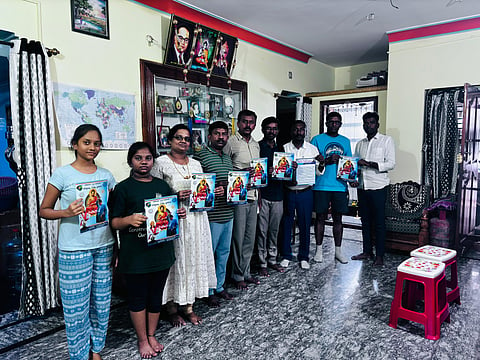
Bengaluru- On June 2, approximately 500 Dalit families in Anekal, Bangalore district, will embrace Buddhism in a significant event marking a resurgence of Buddhist values among the Dalit community.
The conversion ceremony will take place at Dr. B. R. Ambedkar Maidan in Sarjapur town. Preparations are in full swing, with volunteers distributing leaflets door-to-door to ensure maximum participation and awareness.
Anand Chakravarty, the program coordinator, shared with The Mooknayak that around 3000 people are expected to abandon Hinduism and adopt Buddhism during the grand ceremony.
The event is supported by several Ambedkarite organizations, including the Ambedkar School of Thought, Samata Sainik Dal, Neelam Cultural Center, Bhima Book Bank, Phule Civils Academy, and Ambedkar Study Circle. These organizations have been actively conducting awareness programs across various districts and villages in Karnataka to promote this transformation.
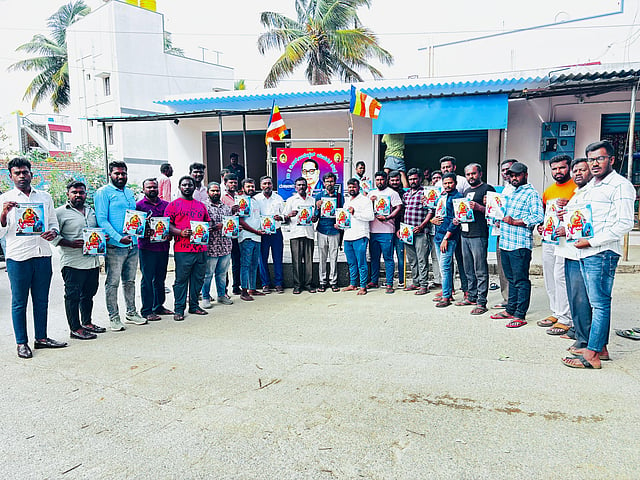
Following Babasaheb's Path
On October 14, 1956, Dr. B. R. Ambedkar, along with approximately 600,000 followers, converted to Buddhism at Deekshabhoomi in Nagpur. This mass conversion was a radical assertion of identity and a rejection of the oppressive caste system that had plagued Indian society for centuries. Ambedkar's conversion was not just a religious act but also a philosophical commitment to equality, compassion, and social justice.
His conversion inspired a wave of social awakening across India, challenging entrenched notions of hierarchy and discrimination.
"All Dalit organizations have united to adopt Buddhism as shown by our leader Babasaheb to escape the vicious cycle of the deteriorating caste system," Anand explained. The voluntary conversion of around 500 families, with 3000 supporters joining them, marks a significant step towards embracing Buddhist values and rejecting caste-based discrimination.
During the ceremony on June 2, the families converting to Buddhism will pledge to follow Babasaheb's 22 vows. These vows include treating everyone with equality, compassion, and fraternity, adopting a scientific approach to life, and living without intoxicants and ostentation.
This commitment symbolizes their dedication to living a life free from the inequalities and discriminations of Hinduism.
After conversion, the neo-Buddhists will abandon Hindu customs, festivals, beliefs, and rituals. Instead of traditional Bhajan Kirtan, Buddha Vandana will resonate in their communities, marking a significant cultural and spiritual shift.
The mass conversion to Buddhism on June 2 marks a turning point, reflecting a continued struggle for social justice and equality. It echoes Ambedkar's legacy, providing the Dalit community with a framework for reclaiming their dignity and rights. This historic event symbolizes the ongoing fight against caste-based oppression and the pursuit of a more just and equitable society.
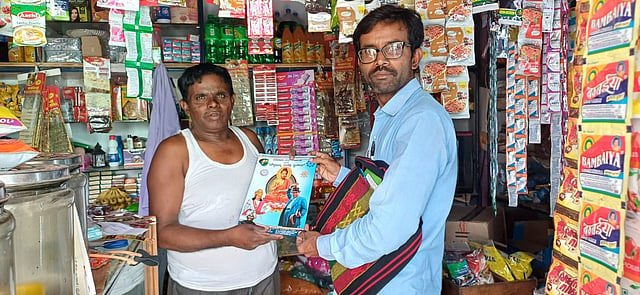
Buddhist Population in India
The Buddhist population in India is approximately 8.44 million, with around 3.6 million residing in urban areas and about 4.8 million in rural areas. The state with the highest Buddhist population is Maharashtra, home to 6.5 million Buddhists.
This is followed by West Bengal with 0.28 million, Madhya Pradesh with 0.21 million, Uttar Pradesh with 0.2 million, Sikkim and Arunachal Pradesh each with 0.16 million, Tripura with 0.12 million, and Jammu and Kashmir with 0.11 million.
Karnataka has a total Buddhist population of 0.097 million, according to the 2011 Census reports by the Government of India.
Why Buddhist Population is declining in Karnataka
As per a research report published in 2022 , Karnataka recorded a significant decline of 76.4% in its Buddhist population between 2001 and 2011, dropping from 393,300 to 95,710. This contrasts sharply with the previous decade, 1991 to 2001, which saw a dramatic increase of 439% in the Buddhist population, rising from 73,012 to 393,300. According to the 2011 Census, the Buddhist population has declined by approximately 76% since 2001.
The reasons for this sharp decline are multifaceted and retrospective. In 1989, under Prime Minister V.P. Singh, a committee was formed to amend the constitution to include converted Buddhists under the Scheduled Castes (SC) category for internal reservation. However, no substantial progress has been made in this direction.
The proposal was to grant converted Buddhists the status of Scheduled Caste Buddhists by adding them to the current list of 101 Scheduled Castes in Karnataka. Since this provision has not been implemented, converted Buddhists do not receive caste certificates, leaving them without the benefits of reservations available to SCs and Scheduled Tribes (STs).
This lack of official recognition and associated benefits has led many converted Buddhists to remain within the Hindu system to access SC/ST reservation benefits.
Additionally, converted Buddhists are not eligible for the 4% reservation allocated to Religious Minority communities in India. They find themselves in a twilight zone, unable to access reservations under either the SC/ST category or as a religious minority.
Compounding the issue, caste certificate issuing authorities, typically Tahsildars at the Tehsil level, often deny certificates to converted Buddhists due to inconsistencies and lack of clarity in the issuing process. This bureaucratic hurdle further discourages conversions and contributes to the decline in the Buddhist population in Karnataka.
.....





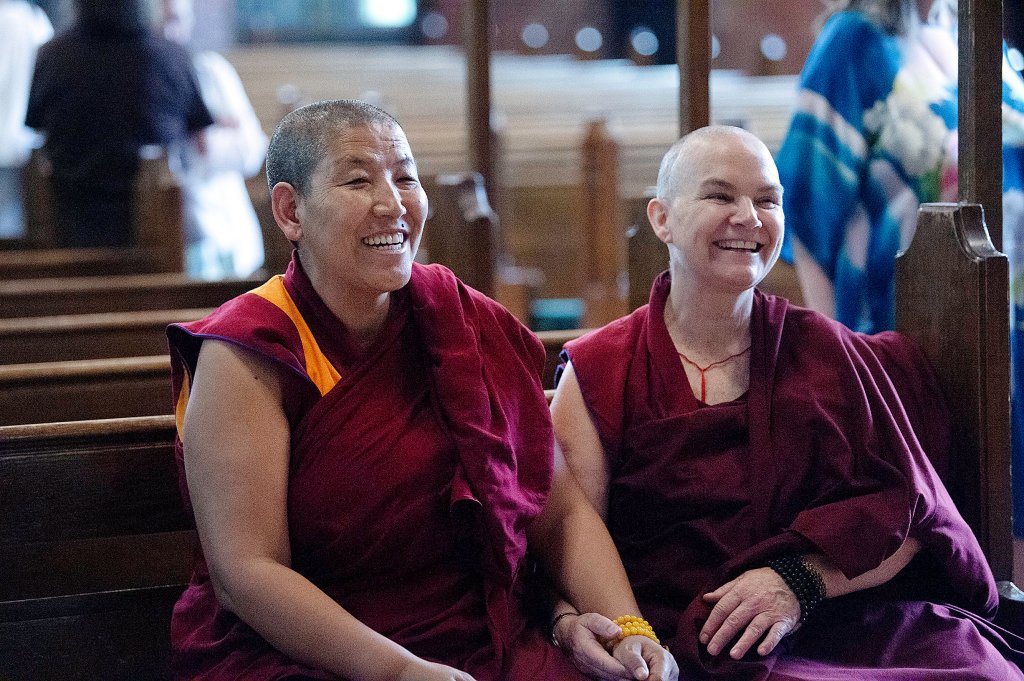
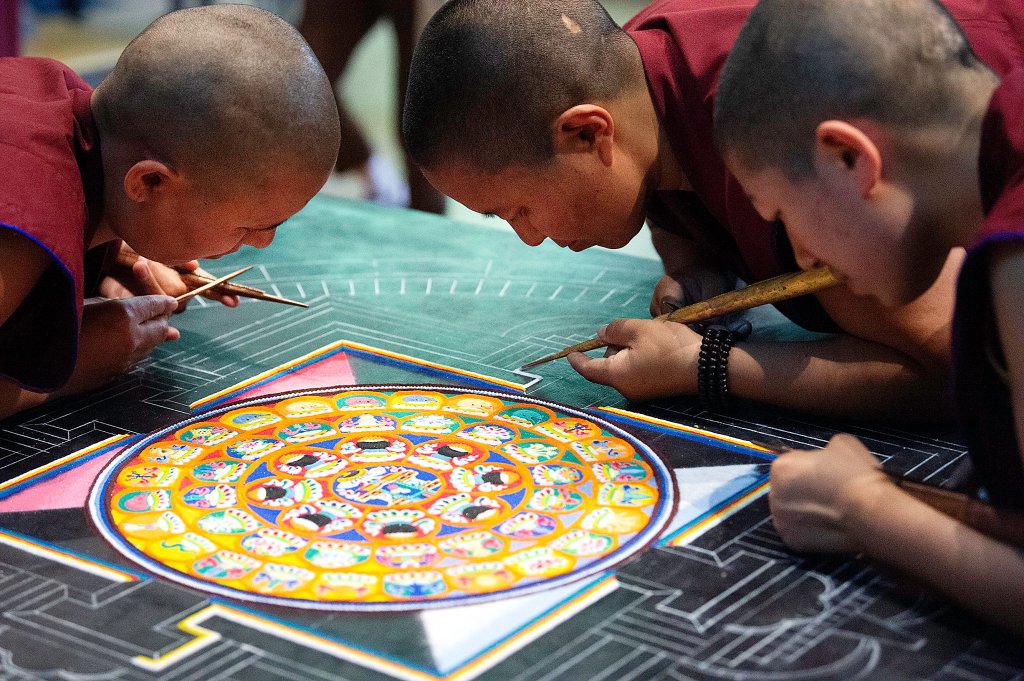
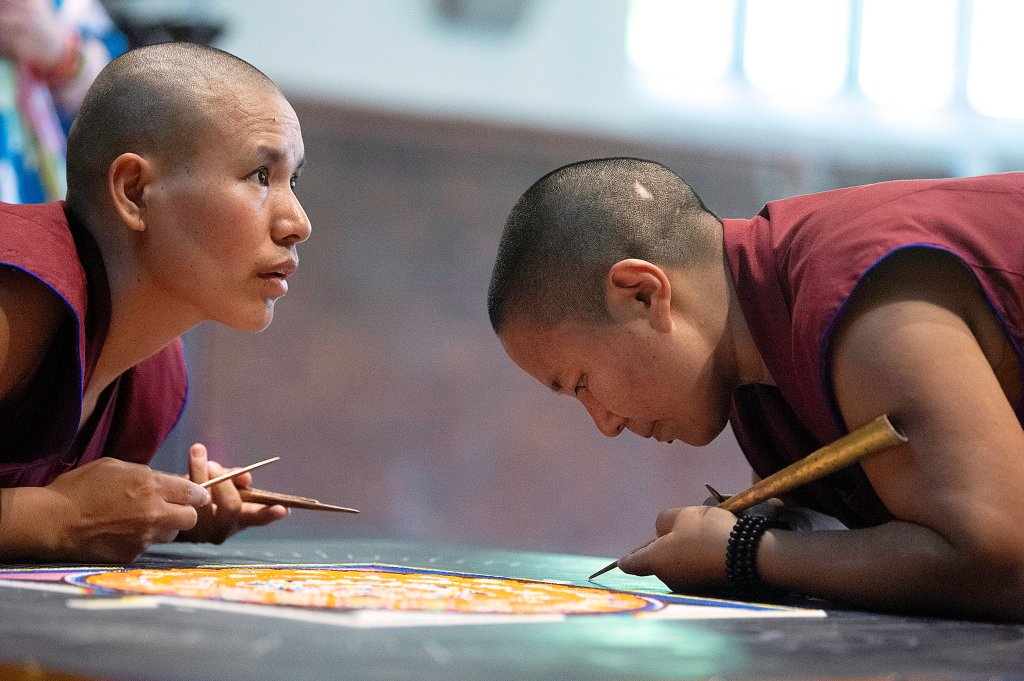
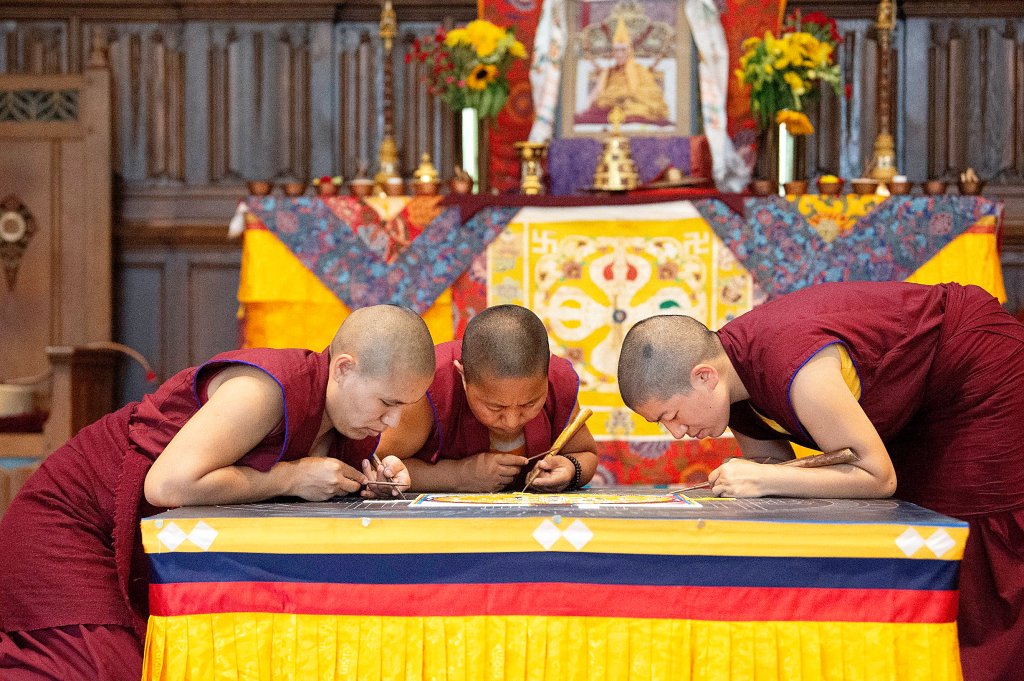
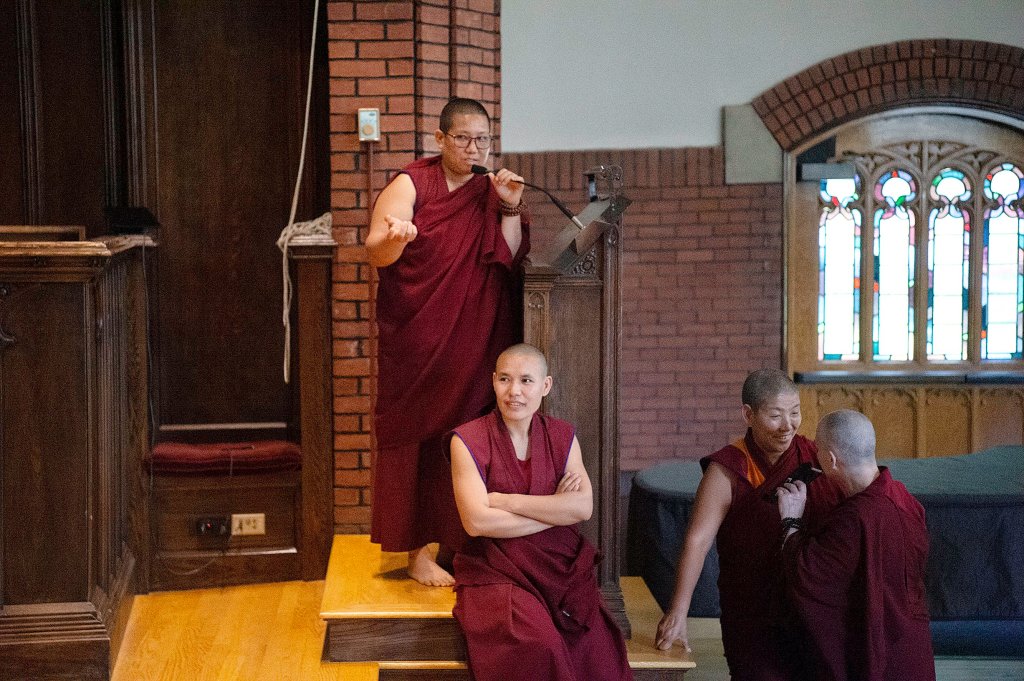
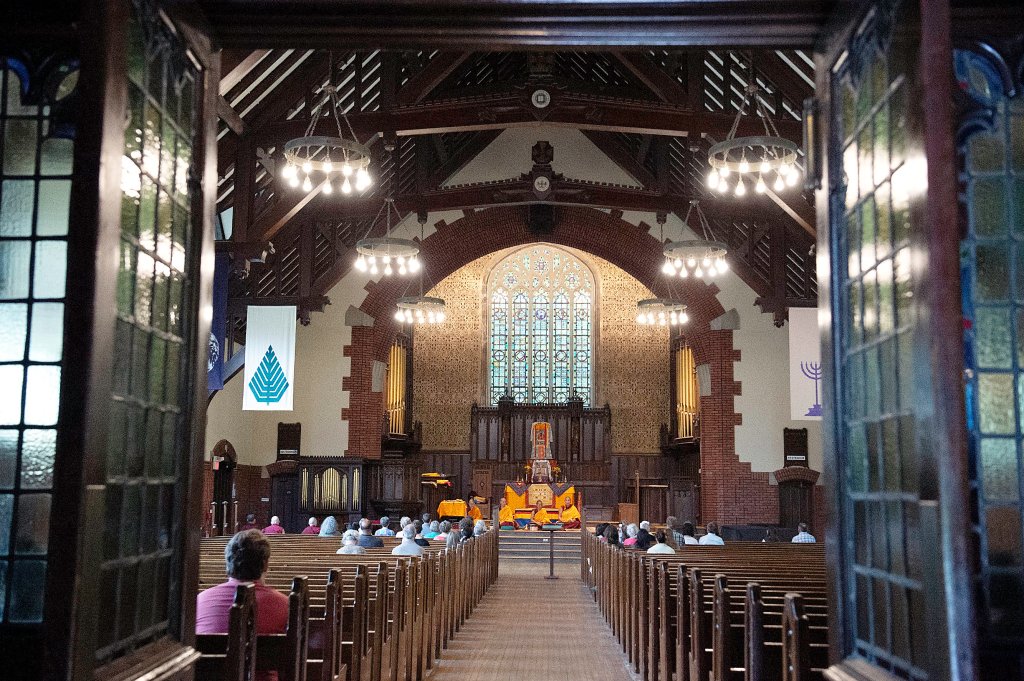











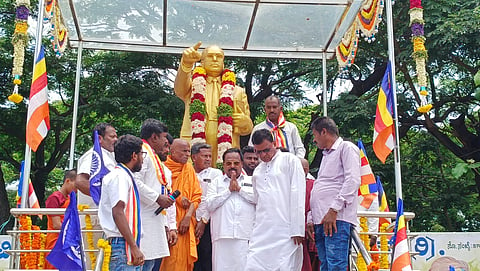



Comments
Post a Comment